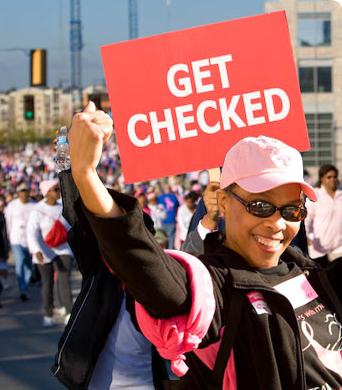Early Detection to Reduce Breast Cancer Deaths by The American Cancer Society .....As the nation marks National Breast Cancer Awareness Month in October, the .....Studies show that early detection of breast cancer through mammography improves treatment options as well as survival. .....Early-stage breast cancer typically produces no symptoms when the tumor is small and most treatable, so it is important that women follow recommended guidelines for finding breast cancer before symptoms develop. Mammography will detect about 80 percent to 90 percent of breast cancers in women without symptoms. .....“Survival rates for breast cancer are significantly higher when the cancer has not spread,” said Georgia Sadler, PhD, president of the Society’s California Division board of directors. “Numerous studies have shown that early detection increases treatment options and can save lives. That is why it is so important for women 40 and older to get an annual mammogram.” Sadler is a clinical professor of surgery at the University of California, San Diego (UCSD) School of Medicine and director of community outreach at the Rebecca and John Moores UCSD Cancer Center in La Jolla. The American Cancer Society recommends yearly mammograms and clinical breast exams for women 40 and older and a clinical breast examination at least once every three years for women between the ages of 20 and 39. The Society also recommends magnetic resonance imaging (MRI) for certain women at high risk. Women at moderate risk should talk with their doctors about the benefits and limitations of adding MRI screening to their yearly mammogram. “While we do not yet know how to prevent breast cancer, we do know that women who maintain a healthy weight, eat a well-balanced diet, and are physically active 45 to 60 minutes on five or more days of the week can reduce their risk of breast cancer,” said Sadler. “Also, limiting alcohol consumption can reduce breast cancer risk – two or more drinks a day may increase breast cancer risk by 21 percent.” .....The American Cancer Society is dedicated to eliminating cancer as a major health problem by saving lives, diminishing suffering and preventing cancer through research, education, advocacy and service. For information on these programs in your area, call the American Cancer Society at 1-800- ACS-2345 or visit their Web site at www.cancer.org |
||
|
||
Bienvenido a la primer revista dedicada al cuidado de la salud
 info
info
The first, the best & the only English & Spanish Magazine in San Diego, California
| CANCER |
| Cancer: What it Means to You |
| Talking with Your Doctor About Cancer-related Pain |
| CAREGIVING |
| How To Be an Effective Caregiver |
| BREAST CANCER |
| Early Detection > |
| THIS PAGE en Español |
| .COLON CANCER |
Colorectal cancer screening saves lives. ..If everyone aged 50 years old or older were screened regularly, up to 60% of deaths from this cancer could be avoided. >> CDC |
| March is National Colorectal Cancer Awareness Month! CMS |
| Everyday Steps to Reduce Colon Cancer Risk |
| Colorectal Cancer Testing on the Rise |
| Prevention the Focus of New Colon Cancer Screening Guidelines |
| LUNG CANCER |
| Lung Cancer Awareness |
| SKIN CANCER |
Why You Should Know About Melanoma ....Melanoma is the most serious of the common type of skin cancer. The good news is that most melanomas can be found early and treated successfully. This brochure describes risk factors for this type of skin cancer, and important tips for finding it early.(PDF) |

 American Cancer Society encourages women to take charge of their personal breast health in the fight against breast cancer. Women 40 and older should have an annual mammogram to detect breast cancer in its earliest, most treatable stage. Nearly 2,000 new cases of invasive breast cancer are expected to occur among women in San Diego in the coming year, and about 450 deaths are expected.
American Cancer Society encourages women to take charge of their personal breast health in the fight against breast cancer. Women 40 and older should have an annual mammogram to detect breast cancer in its earliest, most treatable stage. Nearly 2,000 new cases of invasive breast cancer are expected to occur among women in San Diego in the coming year, and about 450 deaths are expected.